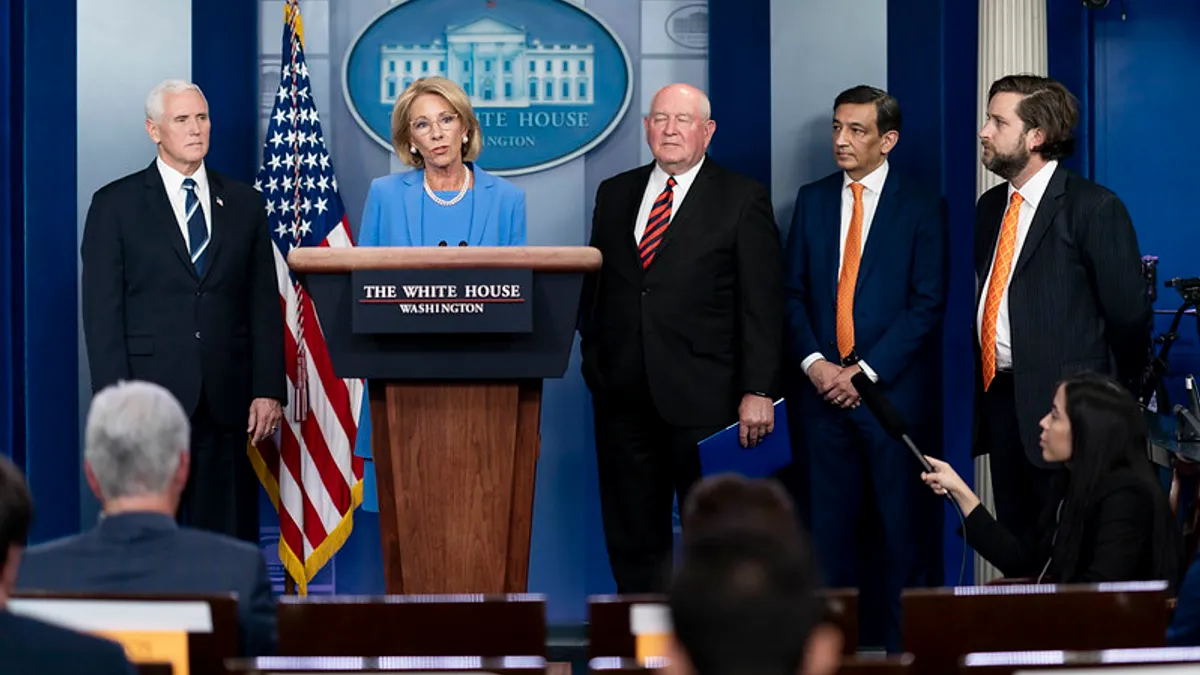Dive Brief:
- Democratic attorneys general from 17 states and the District of Columbia on Thursday filed a lawsuit against U.S. Secretary of Education Betsy DeVos over new Title IX rules released in May. The lawsuit claims putting in place the rules by the Aug. 14 deadline is impractical, considering K-12 schools will be required to "completely overhaul their systems" for sexual harassment complaints while COVID-19 has strained school resources and some stakeholders are not available in summer.
- The AGs also claim three months is not enough time for stakeholders to develop new policies and procedures, and for parents and others to provide feedback, which would hinder community buy-in. Additionally, the lawsuit says the Title IX changes remove protections from victims because of the narrowed definition of sexual harassment, which does not treat isolated incidents like unwanted touching or name calling as "pervasive" enough to be investigated.
- Furthermore, the lawsuit states new Title IX provisions don't take into account the unique circumstances of K-12 schools and students, meaning:
- Schools will be unable to restrict students from sharing sensitive information that could increase the risk of retaliation, harassment or spread of confidential information.
- Schools will be required to first go through a formal appeals process before using "sound forms of discipline" like detention or suspension.
- Younger children and students with disabilities may not be able to communicate social-emotional and other safety concerns.
Dive Insight:
The lawsuit also says there are inconsistencies or need for clarification between the new rules and other laws like the Family Education Rights and Privacy Act and between different sections of the new regulations.
In addition to the need for clarity, many states, the AGs say, already had to squeeze out funds for the implementation of the rules when budgets are tight, or reallocate staff and other resources that would have gone toward COVID-related operations.
When the regulations were released in May, educators expressed concern they would make administrators' jobs more challenging, especially considering pandemic-induced school closures, distance learning and recession.
The significant Title IX changes also require a response from schools if any employees were notified by a student about sexual harassment or assault. This means institutions can be held liable if they fail to respond to notices given to bus drivers, coaches, cafeteria staff and others.
That change would require a substantial amount of policies, training and resources put in place to ensure information travels uphill from the employee to the district.
“Title IX’s mandate is simple: Our schools must give women and men equal access to education, which means no one should experience sexual harassment,” Attorney General Josh Shapiro of Pennsylvania said in a statement. “But instead of making it easier for students to report, and for schools to respond, to sexual harassment, Secretary DeVos has unlawfully narrowed Title IX’s reach."
He added that the short amount of time to make the changes will distract from remote learning and fall reopening plans.
In a statement to Education Dive, the U.S. Department of Education called the challenge "a political press release masquerading as a lawsuit," adding that it does not comment on pending litigation.
It added that the new rules require schools to follow "a reliable, transparent, and fair process in handling complaints of sexual misconduct" to protect all students, codifying "for the first time" that sexual harassment is sex discrimination.
"We know that schools are still receiving Title IX complaints while students learn at a distance, and civil rights are not on hold during this pandemic," the statement continued. "To pretend otherwise is to let students down. Due process rights are survivors' rights — everyone deserves to be treated fairly, and that's what our rule requires."













